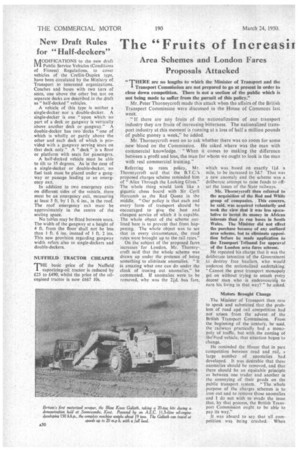The "Fruits of Inereasit
Page 32

If you've noticed an error in this article please click here to report it so we can fix it.
Area Schemes and London Fares Proposals Attacked "THERE are no lengths to which the Minister of Transport and the Transport Commission are not prepared to go at present in order to close down competition. There is not a section of the public which is not being Made to suffer from the pursuit of this policy."
Mr. Peter Thorneycroft made this attack when the affairs of the British Transport Commission were discussed in the House of Commons last week.
" If there are any fruits of the nationalization of our transport industry they are fruits of increasing bitterness. The nationalized transport industry at this moment is running at a loss of half a million pounds of public money a week," he itided.
Mr. Thorneycroft went on to ask whether there was no room for some new blood on" the Commission. He asked where was the man with commercial knowledge. "When it comes to making the difference between a profit and loss, the .man for whom we ought to look is the man with real commercial training."
Referring to rates pokey, Mr. Thorneycroft said that the B.T.C.'s proposed charges scheme reminded him of " Alice Through the Looking GiaSs.". The whole thing would look like a gigantic chess board with Sir Cyril Hurcomb as the Red Queen in the middle. "Our policy is that each and every form of transport should be encouraged to give the best and cheapest service of which it is capable. The whole object of the scheme outlined here is to prevent that from happening. The whole object was to see that in every circumstance, the road rates were brought up to the rail rates."
On the subject of the proposed fares increases for London, Mr. Thorneycroft said that the whole scheme was drawn up under the pretence of being something to eliminate anomalies. "It is amazing what one can do under the cloak of ironing out anomalies," he commented.. If anomalies were to he removed, why was the 21d. bus fare.
which was based on exactly ltd. a mile, to be increased to 3d.? That was a new anomaly and the scheme was a deliberate attempt to raise funds to offset the losses of the State railways.
. Mr. Thorneycroft then referred to
• the acquisition of the Red and White group of companies. This concern, he said, was acquired voluntarily and took the view that it was less speculative to invest its money in African interests than to run buses in South Wales. The Minister did not effect the purchase beeause of any outlined area scheme, but to eliminate opposition before he made 'application to the Transport Tribunal for approval of the London area fares scheme.
He repeated his charge that it was the deliberate intCntion of the Government to destroy free hauliers, who would undercut the nationalized undertaking: "Cannot the great transport monopoly get on without trying to smash every decentman who is endeavouring to earn his living in that way? " he asked.
Motors Brought Change The Minister of Transport then rose to speak and submitted that the problem of road and rail competition had not arisen from the advent of the British Transport Commission. Front the beginning of the Centufy, he said, the railways practically had a monopoly of traffic, but with the coming of the road vehicle,that situation began to change.
He reminded the House that in past competition between road and rail, a large number of anomalies had . developed. It was desirable that these anomalies•shouid be removed, and that there should be an equitable principleas between one trader and another in the conveying of their goods on the public transport system. "The whole purpose of the charges schemes is to iron out and to remove those anomalies and I do not wish to evade the issue that, by that process, the British Transport Commission ought to be able to pay its
It was absurd to say that all competition was being crushed. When




























































































